Iranians Insist They Will Have Full Control Over Any Released Funds
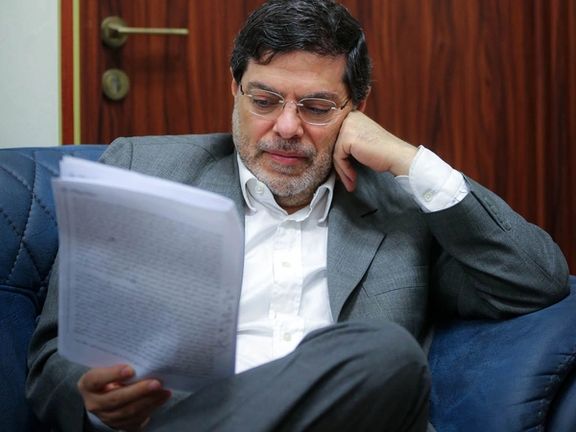
Mohammad Marandi, a regime insider in Iran, says that Tehran will have full access to its funds when they are released from South Korea following a hostage deal.

Mohammad Marandi, a regime insider in Iran, says that Tehran will have full access to its funds when they are released from South Korea following a hostage deal.
It was confirmed on Thursday that five American hostages in Iran were released from prison and put under house arrest, pending the release of $6 billion of Iranian funds held in South Korea due to US sanctions.
Marandi, who was part of Iran’s nuclear negotiating team in Vienna in 2021-2022 tweeted that “Iran will have full and direct access to its released assets, there will be no Qatari companies involved, Iranian banks will have full control, and they can purchase goods and services without any limitation or restriction.”
United States officials have insisted that any frozen funds released from Iraq or South Korea can only be disbursed by US supervision for humanitarian purchases by Iran. The New York Times quoted sources on Thursday that Qatar’s Central Bank might become the repository of Iran’s funds, but the scheme for supervising its expenditure remains unclear.
Iran’s foreign ministry said in a statement on Friday that “The Islamic Republic will decide how to use the released funds, and these funds will be appropriated for the various needs of the country by the appropriate authorities.”
Critics say that the funds would boost the Iranian regime's finances, whether released in cash or with restrictions. If Iran can import food with the funds, it will use its own oil income for its military or malign activities.
Chief of Iran’s central bank visited Qatar in June, in what was interpreted at the time as a trip to begin coordination regarding any possible funds being released from Iraq or South Korea.
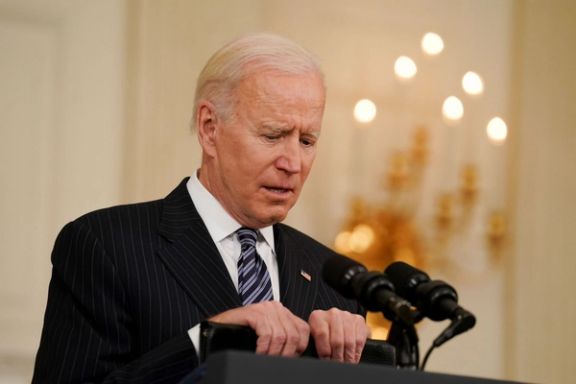
As the White House welcomed the possible release of US hostages in Iran, critics called the $6 billion to be freed in exchange the biggest ransom ever paid by the United States.
Iran immediately corrected the $6-billion amount mentioned by Western media and said that in fact $9 billion was freed, including close to $3 billion frozen in Iraqi banks in addition to $6 billion held by South Korea. In fact, Washington freed the frozen funds in Iraq in June, possibly as the first concession to Tehran in negotiations that seem to have reached a conclusion.
Iranian government media on Friday made it clear that no prisoner will leave Iran until all the money from South Korea is transferred to special accounts in Qatar.
The Biden administration to cushion the negative impact of what is seen as a ransom payment, emphasized that no cash will reach the Iranian government and that the funds will only be disbursed to pay for humanitarian needs, but the exact mechanics of the scheme remain unclear.
The Iranians who see themselves as the big winners in hostage diplomacy, which has often paid off in the past four decades, even claimed that they will be the ones who will decide the fate of the money.
“The Islamic Republic will decide how to use the released funds, and these funds will be appropriated for the various needs of the country by the appropriate authorities,” the foreign ministry said in a statement on Friday.
Mohammad Jamshidi, a top aide to President Ebrahim Raisi, was quoted by the official government news agency IRNA that American prisoners will remain in Iran until all the funds from South Korea are released. Iranian media said that the funds will be exchanged from Korean currency into euros and kept in special accounts in Qatar’s central bank. The White House thanked the Qataris for their good offices in helping secure the deal.
Secretary of State Antony Blinken said on Thursday that the release of five Americans from prison in Iran was a "positive step" and the beginning of a process that he expects will lead to their return to the United States.
Blinken told reporters at a news conference after a meeting with his Mexican counterpart that the State Department had spoken with the five Americans on Thursday and that he was not aware of any other Americans still detained in Iran.
Iranian American activists were deeply dismayed by the Biden administration’s decision to provide a significant financial boost to the clerical regime, which is facing a serious economic crisis.
Amir Hamidi, a former US government official and a political consultant in Washington DC tweeted, “Allocating a staggering $6 billion to Iran amounts to facilitating the transfer of American hostages to a new detention facility, which is an utterly unacceptable concession. We must unwaveringly uphold the principle of not negotiating with terrorists or rewarding hostage-taking.”
Republican law makers almost immediately responded by accusing the Biden administration of caving in to Iran’s hostage diplomacy.
Senator Bill Hagerty (R-TN) said, “The release of American hostages is great and welcome news, But Biden’s policies encourage more hostage taking…The ransom is now $1.2 billion per hostage. Russia and China are taking note.”
Rep. Joe Wilson (R- S. Carolina) posted that “The terrorist regime in Tehran just received a gift of $6 billion from the Biden administration. Biden is showing our adversaries how to evade sanctions & is threatening the safety of Americans around the world.”
The debate around the administration’s Iran policy will take a sharper turn with the hostage deal and will probably become an issue in the 2024 elections. However, President Joe Biden seems to have succeeded in putting a lot of distance between the controversial decision and the election 15 months away.

The United States has confirmed that five Americans have been released from prisons in Iran and are under house arrest, after what reports say is a deal with Tehran.
Iranian sources told the media that the deal would unfreeze $6 billion in Iranian funds in South Korea and some Iranians from US prisons.
"We are relieved to learn that Iranian authorities have released five US citizens -- Siamak Namazi, Morad Tahbaz, Emad Sharghi, and two individuals who at this time wish to remain private -- from prison to house arrest, State Department spokesperson Matt Miller told the media.
“We are in touch with the families of US citizens involved, and we continue to monitor these individuals’ health and welfare closely. While we welcome the news of these individuals’ release from prison to house arrest, they should never have been imprisoned in the first place. We continue to work diligently to bring these individuals home to their loved ones.They must be allowed to depart Iran and reunite with their loved ones as soon as possible," Miller added.
Allowing the five to leave Iran could take weeks, Reuters said, while it is not clear if all the details of releasing the funds held in South Korea have been agreed or not.
"The move by Iran of the American hostages from Evin Prison ... is an important development," Jared Genser a lawyer representing Namazi said in a statement. "While I hope this will be the first step to their ultimate release, this is at best the beginning of the end."
White House National Security Council Spokesperson Adrienne Watson confirmed that the five were all out of prison and under house arrest, saying they should never have been detained and the White House would have little more to add because talks for their eventual release "remain ongoing and are delicate."
Iran's mission to the United Nations, however, told Iranian state media the release of the dual nationals from prison was part of a US-Iranian prisoner exchange deal.
"Under the deal mediated by a third country, five Iranians jailed in the United States will be released and Iran's frozen funds in South Korea will be unblocked and transferred to Qatar," the mission said, according to state news agency IRNA.
DEPARTURE FROM IRAN COULD TAKE WEEKS
Iranian Americans, whose US citizenship is not recognized by Tehran, are often pawns for the Islamic Republic which has a long history of taking Westerners hostage to use as leverage against the United States and European governments.
The five Americans will be allowed to leave Iran after $6 billion of Iranian funds in South Korea are unfrozen, a source told Reuters. A second source familiar with the talks said it could be weeks before the US citizens leave Iran, saying September was a possible time frame. He confirmed unfreezing the funds may be part of the deal.
However, he said the funds, if transferred from the South Korean banks to another financial institution, would go from one restricted account to another and could only be used for humanitarian purposes such as buying food or medicine.
Iran's semi-official Tasnim news agency said the funds were first to be converted from the South Korean currency into Euros and then sent to an account in Qatar that Iran could access.
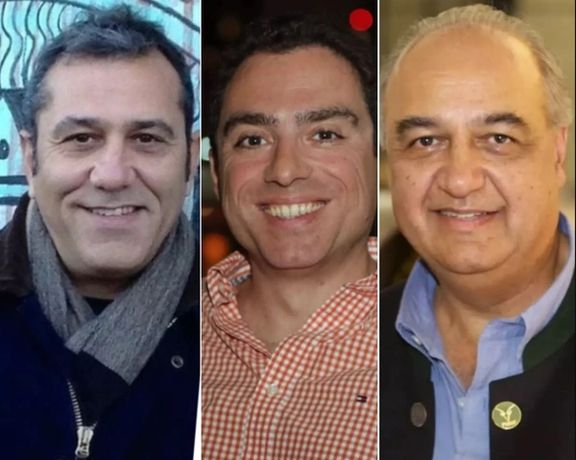
The potential transfer drew immediate Republican criticism that President Joe Biden, a Democrat, had effectively paid a ransom for the US citizens and that Iran using the money for humanitarian goods could free up funds for its nuclear program or to back militias in nations such as Iraq, Lebanon and Yemen.
Henry Rome, an analyst at the Washington Institute for Near East Policy, told Reuters the deal could help reduce tensions that have boiled since then US President Donald Trump, a Republican, withdrew from a 2015 nuclear deal designed to curb Iran's atomic program.
Rome described the potential release of the five as a step forward "in the broader US efforts to de-escalate tensions in the absence of a nuclear agreement" adding that the White House "wouldn't have gone through with the deal if it wasn't confident it could withstand whatever political blowback is forthcoming."
Karim Sadjadpour, a Carnegie Endowment for International Peace analyst, told Reuters that Iranian Americans should still avoid travel to Iran.
"This deal will reinforce the view of (Iran's) Revolutionary Guards that hostage taking is a lucrative practice with minimal costs," he said.
Namazi, who in 2016 was convicted of espionage-related charges the United States has rejected as baseless, has been detained by Iran for more than seven years.
Tahbaz was arrested in 2018 and sentenced to 10 years in prison for "assembly and collusion against Iran's national security" and working for the United States as a spy. Sharghi was convicted of espionage in 2020 and also sentenced to 10 years.

A fire has erupted on a Panama-flagged tanker carrying 40,000 tons of LPG off the southern coast of Assalouyeh, Iran.
Port authorities have successfully rescued 22 sailors, but the blaze has spread across multiple sections of the vessel, prompting immediate containment efforts.
In May, Iran seized two oil tankers – one Panama-flagged and one Marshal Islands-flagged within one week in Persian Gulf waters, marking an escalation in a series of attacks on commercial vessels since 2019.
The US Navy reported that the Panama-flagged oil tanker Niovi was seized by Iran's Islamic Revolutionary Guard Corps Navy (IRGCN) while navigating the narrow Strait of Hormuz.
These events underscore the persistent maritime security concerns in the region, where heightened military activity and geopolitical tensions have cast significant threats upon commercial vessels.
In response to these dynamics, over 3,000 US sailors and marines from the Bataan Amphibious Ready Group (ARG) and 26th Marine Expeditionary Unit (MEU) have been deployed to the Middle East. This robust deployment serves to address escalating tensions between the US and Iran and projects US maritime strength in the face of Iran's aggressive actions, including their recent unveiling of new maritime weaponry.
The ongoing deployment, encompassing vital waterways like the Strait of Hormuz, Red Sea, Suez Canal, and Strait of Bab el-Mandeb, highlights the US Navy's steadfast commitment to securing critical choke points and reinforcing alliances in a complex and challenging geopolitical environment.
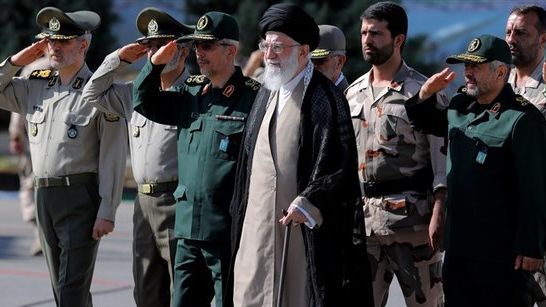
Politicians, diplomats, opposition leaders and activists convened Thursday to urge the UK and EU nations to designate Iran's Revolutionary Guards Corps (IRGC).
During a roundtable online conference hosted by The Jerusalem Center for Public Affairs, speakers gave passionate calls for a galvanization in the international fight against the dangerous military arm of the Iranian regime coupled with impassioned and insightful discourse.
Last week, Britain's home secretary Suella Braverman said Iran's Revolutionary Guard poses a serious risk to UK’s national security amid fresh evidence of its reach.
British-Iranian activist Vahid Beheshti, who was on hunger strike and camped outside London’s Foreign Office earlier this year as part of his bid to raise awareness about atrocities being committed in his homeland and to pressure Prime Minister Rishi Sunak's government to proscribe the IRGC as a terror organization spoke from his mobile phone from London. “Suella’s comment was a great big step in our objective and now I think we are not far from proscription,” he said, offering hope to the many lobbying, while intelligence revelations last week showed Iran to be the biggest threat to the UK.
Lord Stuart Polak, a vocal opposer of the Iranian regime praised Beheshti’s continued campaign and said that combined with the work of journalists in the UK, “the pressure is beginning to tell”. Stressing the need to keep the pressure on the government, he said: “We need to keep lobbying and it will happen, it is about just how long it takes.”

Mohsen Sazegara, Former Iranian Deputy Prime Minister, claimed that 90% of Iranians are ready to remove the regime. “The dominant discourse at the heart of this revolution is a call for democracy and human rights and desire to join the trend of globalization in the world,” he said, as Iranians face the worst economic crisis in decades, many pushed below the poverty line and desperate for a ray of hope.
Other key speakers came from the US, where calls come from both Republicans and Democrats to proscribe the IRGC. David Wurmser, Former Adviser on Middle East to US Vice President Dick Cheney called IRGC the “primary agent of chaos” and stressed the need to move forward with designation without considering any deals.
John Bolton, Former US Ambassador to the UN, who called Iran a “rogue state” said the biggest opportunity for pro-democratic forces in Iran will come when the 84-year-old Supreme Leader Ali Khamenei dies and there is a regime change. “This will be the point when the government is most vulnerable and most fragile and although it is a day that may appear to be remote, it could happen any day and we need to be ready for it.”
The discussion was bolstered by points from European politicians such as Giulio Terzi di Sant'Agata, former Italian Foreign Minister, who stressed that the sanctions taken against a few IRGC individuals was not enough and that “we need to continue until we have obtained our objective that IRGC are on the blacklist.” The issue of proscription has caused division in the EU, like in the UK and US, where the nuclear agenda weighs heavily on the minds of lawmakers. Agata called for all EU member states to ban the IRGC and rally against the “crimes of aggression” that the group is perpetrating at home and abroad.
Israeli Minister of Intelligence, Gila Gamliel gave opening remarks to the roundtable, titled ‘The Path to a Democratic Iran’ during which she said: “On behalf of the free world we urge our friends in the UK and EU to take a stand today for moral clarity and outlaw IRGC.”
She said the 88 million Iranian people were being held hostage to terror and torture and that the international community must give Iranians support to see a way for solutions towards freedom and democracy. “The people of Israel stand firmly with the people of Iran and time is of the essence,” she said.
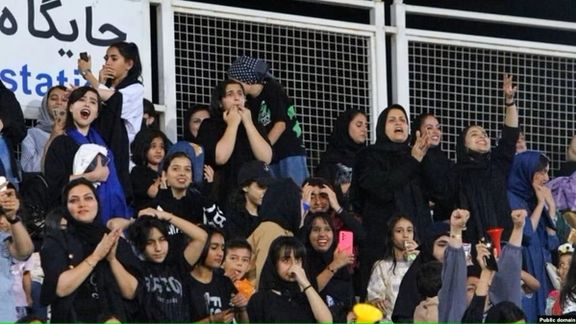
Prompted by stern warnings from FIFA and the Asian Football Confederation (AFC), Iran has reluctantly permitted women to attend a football match outside Tehran.
On Wednesday, women were part of a crowd of local spectators cheering on their teams at a football (soccer) match at Sirjan Stadium in Kerman Province between the city's team and Khuzestan's Foulad FC. It was the first time in 44 years that women have been allowed to attend a football match outside of the capital city.
Just days prior, FIFA and the AFC had expressed serious reservations about Iran's persistent exclusion of women from attending football matches. Permitting women to enter the stadium in Sirjan could have been in response to the mounting international pressure, Shargh daily in Tehran reported.
Although the presence of women at the Sirjan Stadium was extensively promoted through local media, the Iranian press opted to restrict coverage, releasing only a handful of photographs to the public. Notably, several attending women were observed without the mandatory hijab.
It is still not clear if the development in Sirjan is a lasting policy change by the Islamic Republic. Women’s presence in stadiums outside of Tehran has become a controversial issue in recent years. FIFA have been calling for women's entry into stadiums for years, but Iran's Football Federation and other relevant entities had persistently delayed its full implementation.
The Iranian regime's handling of women's participation in football matches has remained under global scrutiny. While there were some limited concessions granted last year, allowing women a controlled entry, the government's reaction to nationwide protests eventually resulted in the revocation of this privilege, leading to months of matches conducted without spectators.